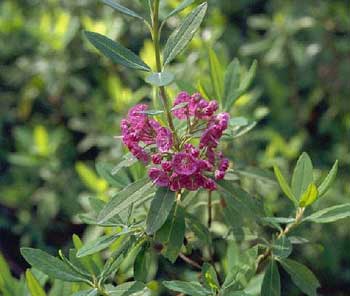Contents:
Common Names | Parts Usually Used | Plant(s) & Culture | Where Found | Medicinal Properties
Uses | Warning | Bibliography
Scientific Names

- Kalmia angustifolia L.
- Heath family
Common Names
- Calico bush
- Mountain laurel (Kalmia latifolia)
- Sheep laurel
- Spoonwood
Parts Usually Used
Twigs, leaves, flowers
Back to Top
Description of Plant(s) and Culture
A small North American plant of the heath family, with pinkish flowers and evergreen leaves; poisonous to sheep and other animals. Slender shrub; 3-5 feet tall. Stems are crooked and have rough bark. Leaves opposite, leathery, elliptical to lance-shaped, 2-3 inches long. Flowers deep rose-pink (or white), to 1/2 inch across; in clusters on sides of twigs; May to July. Flowers are axillary rather than terminal, as in Mountain Laurel (K. latifolia).
Back to Top
Where Found
Found in dry soils, rocky hills and elevated ground in most parts of the United States. New Foundland to Virginia, Georgia mountains; north to Michigan.
Back to Top
Medicinal Properties
Sedative, astringent
Back to Top
Uses
Native Americans used minute amounts of Lambkill flower, leaf, and twig tea for bowel ailments. Tiny amounts of leaf tea used for colds, backaches, stomach ailments. Externally, for swelling, pain, and sprains. The plant, in medicinal doses under medical supervision, is antisyphilitic, sedative to the heart, fevers, tinnitus, vertigo, jaundice, neuralgia, and inflammation.
According to one herbalist, the antidote for poisoning from this herb, whether of man or beast, is whiskey.
Back to Top
Warning
Highly toxic! Do not ingest. Use only under medical supervision.
Back to Top
Bibliography
![]() Eastern/Central Medicinal Plants
Eastern/Central Medicinal Plants, by Steven Foster and James A. Duke., Houghton Mifflin Company, 215 Park Avenue South, New York, NY 10000
![]() Indian Herbalogy of North America
Indian Herbalogy of North America, by Alma R. Hutchens, Shambala Publications, Inc., Horticultural Hall, 300 Massachusetts Avenue, Boston, Massachusetts 02115, 1973
![]() Webster’s New World Dictionary
Webster’s New World Dictionary, Third College Edition, Victoria Neufeldt, Editor in Chief, New World Dictionaries: A Division of Simon & Schuster, Inc., 15 Columbus Circle, New York, NY 10023
